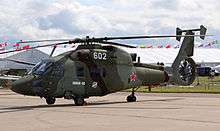Russian Helicopters
JSC Russian Helicopters (Russian: Вертолеты России Vertolety Rossii) is a helicopter design and manufacturing company headquartered in Moscow, Russia. The company designs and manufactures civilian and military helicopters. The company's principal shareholder is Rostec.[5] It is the world's 24th-largest defence contractor measured by 2012 defence revenues, and the second-largest based in Russia (after Almaz-Antey).[6]
 | |
| Joint-stock company | |
| Industry | Aerospace |
| Founded | 2007 |
| Headquarters | Moscow , Russia |
Area served | Worldwide |
Key people | |
| Products | Civilian and military Helicopters |
| Revenue | $3.2 billion[3] (2016) |
| $483 million[4] (2016) | |
| $242 million[3] (2016) | |
| Total assets | $5.49 billion[4] (2016) |
| Total equity | $1.77 billion[4] (2016) |
Number of employees | 46000 |
| Parent | Rostec |
| Divisions | see structure |
| Website | www |
History
The company attempted to stage an IPO on the London Stock Exchange in May 2011, but failed to fill the order book at the expected valuation of $2 billion.[7][8]
In 2011 Russian Helicopters and the Italian company AgustaWestland agreed to establish HeliVert, a joint company, in order to start production in Russia of the AW139 twin-engine multipurpose helicopter. The production plant is located in Tomilino, Moscow Region.
In 2016 the company delivered 189 aircraft to customers in 13 countries. In the same year, it ended a partnership with the Ukraine-based engine maker Motor Sich.[9]
In 2017 the Russian Direct Investment Fund (RDIF) formed a consortium comprising leading Middle Eastern funds and finalized a deal to acquire a minority stake in Russian Helicopters (part of the Rostec State Corporation). Russian Helicopters valuation was estimated at $2.35 billion. No details have been revealed about the identity of the Middle Eastern investors.[10]
The transaction consists of two stages. The first stage involves the sale of a 12% stake and an investment of $300 million, as well as an agreed-upon subsequent potential increase in investment to $600 million. The deal will increase the authorized capital of the holding company. This will accumulate a significant amount of funds within the Company. These funds are necessary for the implementation of the Company’s strategy and business plan, including the development of new types of helicopters. In addition, these funds will help implement the investment program of the holding company, as well as finance possible M&A activities aimed at increasing the holding’s value and finance capital programs.[11]
Products
Russian Helicopters' products include:
- Kamov Ka-27
- Kamov Ka-31
- Kamov Ka-52
- Kamov Ka-60/62
- Kamov Ka-226
- Kazan Ansat
- Mil Mi-8
- Mil Mi-17
- Mil Mi-24
- Mil Mi-26
- Mil Mi-28
- Mil Mi-34
- Mil Mi-38
- Mil Mi-54
- VRT 500
A fifth generation helicopter is currently under development.[12]
Minoga naval helicopter project
In 2006 the Russian defense ministry awarded Russian Helicopters a R&D contract for a naval helicopter conducting antisubmarine warfare among other tasks, following the coaxials Kamov Ka-15, Ka-25, and Ka-27. The resulting Minoga project has been wind-tunnel tested since, the Russian Navy will inspect a mockup in early 2019 and its maiden flight is planned for 2020. It may be coaxial and could be based on the early 2000s Ka-92 concept competing with the Mil Mi-X1 for a high-speed civilian helicopter halted in 2015.[13]
Powered by two 380 kg (772 lb) Klimov TV7-117V turboshafts developing 3,500-3,750 hp in emergencies, 2,500-3,000 at maximum takeoff weight, and 1,650 hp in cruise; they are interchangeable with their VK-2500 predecessor, indicating a larger rotorcraft than in 2015, powered by NPO Saturn RD-600V. It has to be compact enough to store two in a ship hangar housing a single 12 tons Ka-27: Kamov studied a lightweight deck helicopters from four-five to seven-eight metric tons. The Kamov Ka-52K Katran is in flight tests but is limited to electronic reconnaissance and airstrike.[13]
Structure
The following entities are part of the company:[14]
- Designers
- Mil Moscow Helicopter Plant
- Kamov Design Bureau
- VR-Technologies
- Manufacturers
- Ulan-Ude Aviation Plant
- Kazan Helicopters
- Rostvertol
- Progress Arsenyev Aviation Company
- Kumertau Aviation Production Enterprise
- Components
- Reductor-PM
- Stupino Machine Production Plant
- Joint ventures
- HeliVert
See also
Comparable major helicopter manufacturers:
References
- "Management". Russian Нelicopters. 2017. Retrieved 25 January 2017.
- "Board of Directors". Russian Нelicopters. 2014. Retrieved 29 September 2014.
- http://www.russianhelicopters.aero/en/press/news/Russian_Helicopters_reveal_financial_results_for_2016/.
- "FY2016 Consolidated financial statements" (PDF). Retrieved 16 November 2018.
- ""Ростех" ликвидировал корпорацию "Оборонпром"". РИА Новости (in Russian). 11 January 2018. Retrieved 23 October 2018.
- "Defense News Top 100 for 2012". Defense News. Archived from the original on 24 December 2013. Retrieved 22 July 2014.
- "Russian Helicopters postpones $500 million IPO-source". Reuters. 2011. Retrieved 18 August 2017.
- "Russian Helicopters postpones London IPO". Financial Times. Retrieved 18 August 2017.
- "Russian Helicopters deliveries slid 11% in 2016 - Russian aviation news". Russian Aviation Insider. 5 May 2017. Retrieved 22 June 2017.
- "International consortium buys 12% stake in Russian Helicopters - Russian aviation news". Russian Aviation Insider. 22 February 2017. Retrieved 22 June 2017.
- "Rostec :: News :: Rostec and RDIF attract leading international funds to invest in Russian Helicopters". rostec.ru. Retrieved 2017-03-14.
- Oleg Nekhai (17 May 2010). "Russia plans to develop fifth generation helicopter". Retrieved 29 September 2014.
- Vladimir Karnozov (May 21, 2018). "New Russian Naval Helicopter Project Makes Progress". Aviation International News.
- "Structure". Russianhelicopters.aero. Retrieved 6 May 2017.
